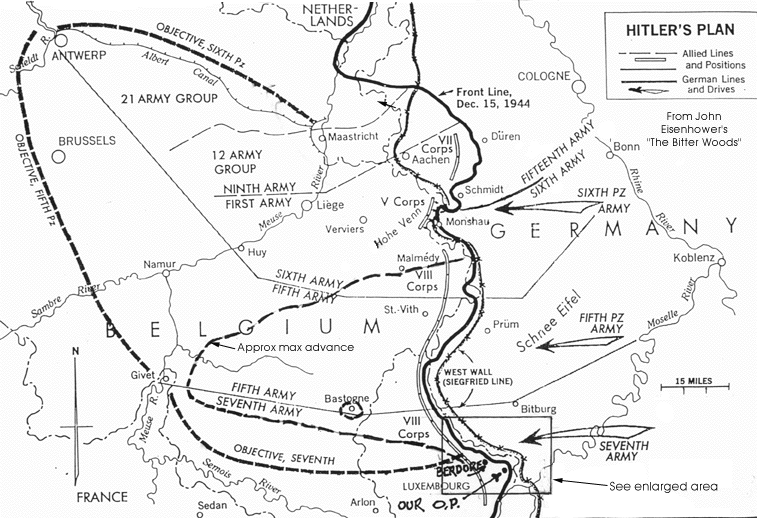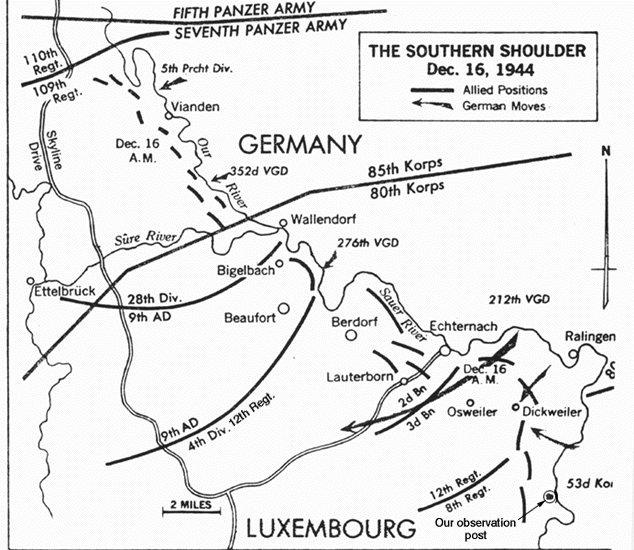
Glenn Warren's Memories and Mine
by
1st. Lt. William G. Cole

I recently found a map which I had used during the winter in Luxembourg during the "Bulge".
It is very detailed and may be kin to Michelin road maps. Certainly, as John Ausland
points out, they have been mapping that area for military purposes for centuries. The
good detail of that map helped me determine the approximate location of the observation
post shown on the following situation maps taken from John Eisenhower's book The Bitter Woods.

The Enlarged Area Map

Glenn Warren, a bright young non-com, who had been recommended for consideration for a direct
commission got wounded while he was with me at that OP. There was a hedgerow across the front of
the OP. In about the center of the position there was a dry-masonry stone enclosure without a
roof which afforded some cover. I was at the hedgerow in a place which gave me the best visibility
when German mortar fire began to fall right on us. I stayed where I was, trying to see something
and sent the radio crew to the stone enclosure. A mortar shell hit the wall or the ground inside
the enclosure and wounded Glenn. He got many fragments in his leg and one in an eye. He absorbed
all of a 60mm mortar shell. He lost sight in the eye and spent months in the hospital.
Dear Bill,
It was so good to hear from you. Isn't it something that after 53 years we are privileged to get
in touch? All of those years I have wondered about you, where you were and how you were doing.
Our getting in touch has brought back so many memories, pleasant and sad. Each year I invade
Normandy; also experience the events of December 29 at about 1:00 o'clock when I was wounded.
If I could put on video of all my memories from June 6 at approximately 6:00 AM to December 29 at
1:00 o'clock, there would be several full length movies. I will relate some of them.
On D-Day morning, before good daylight, we (K Company, 8th Infantry, Lt. Winters and I) got into
the landing craft and headed for Utah Beach. After reaching the beach we assembled and proceeded
through this mine field. The engineers had cleared a path for us and had laid a tape for us to walk
on, but one of the infantry boys stepped off of it onto a mine which exploded and he was seriously
wounded. We made contact with the paratroopers that afternoon. The next morning we were along the side
ditches of this country road when two Germans came in from the rear and killed two infantry boys.
In a fire fight one German was killed the other captured. The one captured kept saying "Me Polish,
me Polish." He was being taken to the rear. This same morning the infantry colonel was killed by a
sniper.
We were the first on-foot troops to enter Ste. Mere Eglise. I remember seeing a trooper hanging from
the church steeple, still in harness. I thought he was dead but a newspaper article in Hockert's
home town gave some statements about the 50th Anniversary from five different branches. It stated that
a trooper who jumped into Ste. Mere Eglise and was hanging from the steeple was pretending to be dead.
He had been wounded in the upper leg.
The description of our O.P. was perfect. I had the same feeling as you as we would walk across
the clearing. Thinking about that day I was wounded: everything had been quiet until then. When I heard
those three mortars fire I knew that my time had come.
I was in the hospital near Bath, England until April 4, I believe it was. Anyway, I was carried by stretcher
on to the Queen Elizabeth on the 6th of April, landed in New York April 12th, stayed in the hospital there
for a few days and was sent to a hospital (nearest my home in Hardin, Kentucky) in Palo Alto, California.
How about that?
I came home on a 30 day leave and married (as any husband would say) the most wonderful person, on May 23, 1945.
Her name is Dorothy and we have a great son, a wonderful daughter-in-law, and eighteen months ago were blessed
with our first grandchild, Benjamin, whom we adore.
Your friend,
Glenn
Before and during the Battle of the Bulge Jack Cunningham and I alternated at an observation
post at an infantry outpost overlooking the pillboxes of the main German defense line. When I
think about it I see snow covering everything and can't visualize it otherwise. We walked half
a mile or so from the nearest road, partially through woods and partially in the open, to get
to the OP. I felt vulnerable making that walk because the area was very lightly held by our
outpost. We spent the night in a small crossroad village perhaps two miles behind the outpost.
Following are excerpts from Glenn's letter to me, undated, in 1997:
Note: 1st. Lt. William G. Cole and Glenn Warren were members of C Battery,
29th FA at the time of these stories.
I bought "tanker" clothing consisting of a lined jacket and "bib overall" trousers for the people in my
forward observer party and it was the smartest thing I did. Those clothes were not bulky, closed
tightly, didn't restrict movement when diving for cover, and were warm. I used money (francs)
which I removed from the wallet of a German officer who surrendered to me the day of the breakout
-- the big bombing -- July 25. He stepped out in front of me and said in English that his tank was
out of gas. I got a Luger pistol from him and one of my radio operators took his wrist watch after
asking me if it was OK. There wasn't a chance that the officer could have kept his watch so we
may as well take it.
I announced at the time that I took the money that I was going to buy winter clothing with it, and
tanker clothes is what I had in mind.
I talked to Joe Gude for the first time that day and gave him the Luger pistol. I didn't have a
convenient way to carry it and we were busy. I figured than an infantry officer needed the pistol
more than me. On reflection, I believe Gude expressed envy at the trophy, and in view of what those
people had been through I felt he deserved it. He was an outstanding officer who got three Silver
Stars and two Purple Hearts. I wasn't making plans for getting back home anyway.
I was as good as my word. I ordered tanker clothes which were for sale (maybe at the PX) and they
arrived, I believe, before the winter got bitterly cold. At the time, Noah had been wounded and was
not with the battery and we kept his tanker suit on the Jeep. Several people tried to buy the clothes.
I always said that they were being saved for Noah. He was very glad to get them when he returned
but never said very much in gratitude. Bernie Mayer got a set of the clothes and loved them. Joe
Gochenauer also got a set.